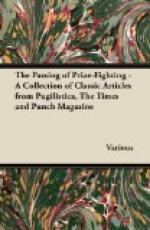“Albemarle Road—don’t you want Albemarle Road?” the conductress was asking me. She spoke very loudly.
“Pontresina—I’m Pontresina,” I answered.
“This is Albemarle Road. If you’re going on it’ll be another penny,” she insisted.
I rose in bewilderment.
St. Ives was looking at me while she knitted. I raised my hat to her and smiled. We had been such good friends all the evening—how could I ever forget it? But she did not smile; she only stared. She seemed to think I was mad. Macclesfield was reading his Star just as if he had never hurled himself on to the top of the ’bus. The flapper was squinting at herself in a little pocket-mirror; she looked contemptuously at me as I passed. Old York was half asleep. One would think they had never been rushing about in that frantic General Post. And we were all inside the car again.
It was odd!
* * * * *
[Illustration: “THE BLOKE WOT PAINTED THAT KNEW ‘OW TO DO A BIT O’ FOOD ’OARDING, DIDN’T ’E?”]
* * * * *
’TWAS FIFTY YEARS AGO.
(Lines suggested by an old Magazine.)
Published the year I went to school—
The second of life’s
seven ages—
How fragrant of Victorian rule
Are these forgotten pages!
When meat and fruit were still uncanned;
When good CHARLES DICKENS
still was writing;
And SWINBURNE’S poetry was banned
As rather too exciting.
No murmurs of impending strife
Were heard, no dark suggestions
hinted;
Our novelists still looked on life
Through spectacles rose-tinted;
And Paris, in those giddy years,
Still laughed at OFFENBACH
and SCHNEIDER,
Blind to the doom of blood and tears,
With none to warn or guide
her.
The index and the authors’ names,
Their stories and their lucubrations,
Recall old literary aims
And faded reputations;
We wonder at the influence
That SALA’S florid periods
had on
His fellows, and the vogue immense
Of versatile Miss BRADDON.
And yet I read Aurora Floyd
In youth with rapture quite
unholy—
Not in the way that I enjoyed
Mince-pies or roly-poly;
While “G.A.S.” appeared to
me
Like a Leonid fresh from starland,
Not the young lion that we see
Portrayed in Friendship’s
Garland.
And there are tinklings of the lute
In orthodox decorous fashion,
But altogether destitute
Of “elemental”
passion;
And illustrations which refrain
From all that verges on the
shady,
But glorify the whiskered swain,
The lachrymose young lady.
The sirens of the “sixties”
showed
No inkling of our modern Circes,
And swells had not evolved the code
That guides our precious Percys;
Woman, in short, was grave or gay,
But not a problem or a riddle,
And maidens still were taught to play
The harp and not the fiddle.




